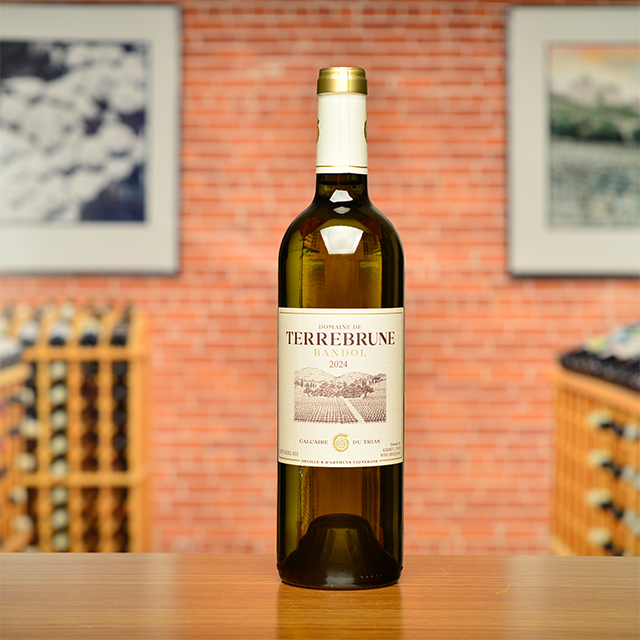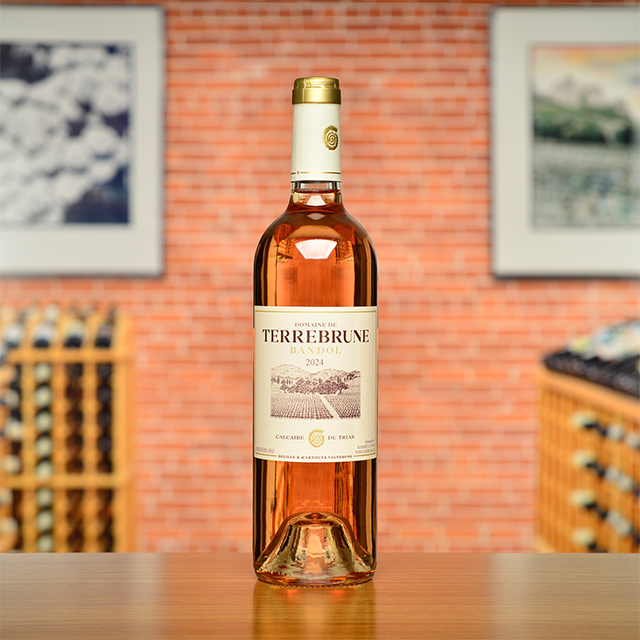Notify me
2018 Bandol Rouge
Domaine de Terrebrune
Terrebrune’s location less than two miles from the shoreline, in the direct path of marine breezes, makes it a Bandol unlike the others. You’ll know it before even pulling the cork—the alcohol content of 13.5% is low for a sun-kissed Mourvèdre- and Grenache-based blend, but the terroir here allows the grapes to ripen fully with less sugar accumulation than in more inland areas. For all its gracefulness and light touch, this wine is still packed with nuance, with a sturdy backbone that will allow it to keep drinking wonderfully for decades. It’s sneaky that way, kind of like when you meet Terrebrune proprietor Reynald Delille, a tall, slender, and soft-spoken man, and then learn he is a master of aikido and a highly competitive water skier.
—Anthony Lynch
| Wine Type: | red |
| Vintage: | 2018 |
| Bottle Size: | 750mL |
| Blend: | 85% Mourvèdre, 10% Grenache, 5% Cinsault |
| Appellation: | Bandol |
| Country: | France |
| Region: | Provence |
| Producer: | Domaine de Terrebrune |
| Winemaker: | Reynald Delille |
| Vineyard: | 20 years average |
| Soil: | Limestone pebbles in brown clay, blue limestone bedrock, marl |
| Aging: | Wine ages in oak foudres for 18 months |
| Farming: | Organic (certified) |
| Alcohol: | 13.5% |
More from this Producer or Region

2023 Bandol Rosé HALF BOTTLE
France | Provence
Peach-scented Bandol rosé is the bee’s knees on a warm summer afternoon.

2024 Bandol Rosé
France | Provence
Bursting with clementine, white peach, and lavender, Agnès Henry’s rosé is divine with summer dishes.

2024 Bandol Blanc
France | Provence
This mineral blend has an ethereal perfume, reminiscent of blossoming flowers with a hint of fennel.

2024 Alpilles Rouge “Cinsault”
France | Provence
Given its hue and zesty, mouthwatering nature, you might wonder if this “rouge” is more of a rosé.

2023 Bandol Rouge “La Migoua”
France | Provence
The most open-tasting single vineyard from Tempier, where its tinge of rosemary, wisp of anise, and hint of smoke combine for a glass full of deliciousness.

2024 Bandol Rosé
France | Provence
A terroir-driven rosé redolent of a Provençal summer with notes of thyme and white peach, and a mouthwateringly salty finish.

2022 Côtes de Provence “Blanc de Blancs”
France | Provence
This gorgeous blend of Vermentino, Ugni Blanc, Sémillon, and Clairette is both fleshy and mineral-driven.

2020 Bandol Rouge
France | Provence
Here is a full-bodied dose of Terrebrune terroir you can enjoy over the next thirty years.

2023 Vin de Pays du Mont Caume Rouge “Terre d’Ombre”
France | Provence
A vivid purple color, it is akin to fresh-pressed wild berries and perfumed hints of flowers and pepper, without the dense, grippy tannin characteristic of a true Bandol.

2023 Bandol Rouge
France | Provence
This Tour du Bon rouge, with its juicy nose and bright, crunchy fruit, its mouthwatering acidity and peppery verve, is particularly elegant.
About The Producer
Domaine de Terrebrune
About The Region
Provence

There is perhaps no region more closely aligned with the history of Kermit Lynch Wine Merchant than Provence. While Kermit began his career as a Burgundy specialist, he soon fell in love with Provence and its wines, notably the legendary Bandols of Domaine Tempier, which he began importing in 1977. He later began living in the area part-time, returning frequently between tasting trips, and today he spends most of his time at his home just outside of Bandol.
Provence is thought to be France’s most ancient wine region, established when Greek settlers landed in the modern-day port city of Marseille in the 6th century BC. The conditions here are ideal for cultivation of the grapevine, with a hot, dry climate and a prevalence of poor, rocky soils, primarily limestone-based, suitable for vines and not much else. The ever-present southern sunshine as well as the mistral, a cold, drying wind from the northwest that helps keep the vines free of disease, are crucial elements of Provençal terroir. Wild herbs from the pervasive scrubland, called garrigue, and cooling saline breezes from the Mediterranean also contribute to the quality and character of wines in all three colors.
Provence is well known for its rosés, but red wines have always held importance here. The very best, such as those from Bandol, possess great depth and a capacity for long-term aging. The white wines, notably those of Cassis, offer weight balanced by a maritime freshness, making them ideal pairings for the local seafood. Mourvèdre reigns king for red grapes, supported mainly by Grenache and Cinsault, while Clairette, Marsanne, Rolle, and Ugni Blanc are the region’s principal white grapes.
More from Provence or France
Les Baux de Provence Olive Oil “Les Baux”
Moulin Jean-Marie Cornille | Provence
2022 Alpilles Blanc “Clairette”
Domaine Hauvette France | Provence
2023 Bandol Rouge
Domaine de la Tour du Bon France | Provence
2024 Bandol Rosé
Domaine de Terrebrune France | Provence
2023 Bandol Rouge
“La Tourtine”
Domaine Tempier France | Provence
2020 Alpilles Rouge “Cornaline”
Domaine Hauvette France | Provence
2024 Bandol Blanc
Domaine de Terrebrune France | Provence
2022 Bouches-du-Rhône Blanc “Baume Noire”
Clos Sainte Magdeleine France | Provence
2020 Bandol Rouge
Domaine de Terrebrune France | Provence
2024 Bandol Rosé
Domaine du Gros ’Noré France | Provence
2022 Côtes de Provence “Blanc de Blancs”
Clos Saint-Joseph France | Provence
2023 Bouches-du-Rhône Blanc “Baume Noire”
Clos Sainte Magdeleine France | Provence
Les Baux de Provence Olive Oil “Les Baux”
Moulin Jean-Marie Cornille | Provence
2022 Alpilles Blanc “Clairette”
Domaine Hauvette France | Provence
2023 Bandol Rouge
Domaine de la Tour du Bon France | Provence
2024 Bandol Rosé
Domaine de Terrebrune France | Provence
2023 Bandol Rouge
“La Tourtine”
Domaine Tempier France | Provence
2020 Alpilles Rouge “Cornaline”
Domaine Hauvette France | Provence
2024 Bandol Blanc
Domaine de Terrebrune France | Provence
2022 Bouches-du-Rhône Blanc “Baume Noire”
Clos Sainte Magdeleine France | Provence
2020 Bandol Rouge
Domaine de Terrebrune France | Provence
2024 Bandol Rosé
Domaine du Gros ’Noré France | Provence
2022 Côtes de Provence “Blanc de Blancs”
Clos Saint-Joseph France | Provence
2023 Bouches-du-Rhône Blanc “Baume Noire”
Clos Sainte Magdeleine France | Provence
Our Guarantee

Our Guarantee
We only import wine we drink and enjoy ourselves, directly from the source.
Our wine tastes the same in your home as it did where it was bottled in Europe.
Like the long-term relationships we build with growers, we build long-term relationships with our clients. Have a question? Need wine advice? Just give us a call—510-524-1524.

















